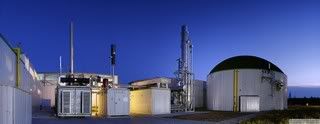Schmack Biogas to build biogas plant coupled to ethanol facility, fed by residues

The Polish biogas plant will be engineered to tie in with an existing bioethanol plant which will supply residuals from bioethanol production as the main feedstock for the biogas production. In turn, the biogas plant will not only produce electricity but also feed its process heat back to the bioethanol plant. Dr. Karl Reinhard Kolmsee, Schmack Biogas AG's Managing Board member in charge of sales says this is a highly ecologically optimised cycle which makes excellent economic sense.
When ethanol is made from grains, its major byproduct is distillers’ dried grains (DDG, or in their original form, wet distillers grains: WDG) which has alternative, low value added uses as as animal feed (previous post) or as an organic fertilizer and herbicide (more here). Several researchers think DDG can be used for a range of more valuable products like biohydrogen or chemicals like polyhydroxyalkanoate (PHA) used for the production of biodegradable plastics (earlier post). Schmack Biogas sees WDG as an excellent feedstock for anaerobic digestion, provided production systems are highly integrated:
 energy :: sustainability :: biomass :: bioenergy :: biofuels :: ethanol :: anaerobic digestion :: biogas :: biomethane :: Poland ::
energy :: sustainability :: biomass :: bioenergy :: biofuels :: ethanol :: anaerobic digestion :: biogas :: biomethane :: Poland :: Dr. Kolmsee adds that the construction of this technologically sophisticated plant marks the company's entry into another European market, thereby demonstrating the future potential and long-term viability of biogas and highlighting the continued strong demand on the part of energy providers and investors.
Schmack Biogas AG is a leading German supplier of biogas plants. Established in 1995, the company provides its services through two divisions, namely Planning and Construction and Plant Management and Service, and is one of the few full-service providers in the industry. Apart from technical support, the company focuses on comprehensive microbiological service.
Through its newly established subsidiary, Schmack Energie Holding the company now also operates its own plants and markets the biogas produced as well as the electricity and heat generated - mainly together with joint venture partners. To date, Schmack Biogas has built 201 plants with a combined nominal output of approx. 58 MW.
According to a recently published Energy Barometer on Biogas, the renewable fuel has a large potential in Europe and is growing rapidly amid increasing concerns about oil and gas prices and climate change. In 2006, around 5.35 million tonnes of oil equivalent (mtoe) was produced in the EU, an increase of 13.6% compared to 2005. The production of electricity from biogas grew by 28.9% over the same period. Germany remains European leader and noted a 55.9% growth in 2006 in electricity generated from the renewable gas.
Analysts, amongst them a founder of Schmack, have found that over the long term (2020-2030) the European biogas sector can replace all imports of natural gas from Russia (earlier post).
Biogas has seen a growing interest in the EU because of the fuel's excellent greenhouse gas emissions and energy balance (earlier post and here).
When the green gas is purified and upgraded as biomethane to natural gas quality, it can be used in the form of fuels for vehicles running on natural gas (CNG) (earlier post) or injected into the natural gas distribution network, when this is so permitted by national legislation (more here). Both applications are being undertaken in several EU member states. Use of the green gas in fuel cells is a recent development (more here).
Image: EUCO Titan® 640, a Schmack Biogas plant. Credit: Schmack Biogas AG.
References:
Biopact: Steps to biorefining: new products from biofuel leftovers - August 10, 2007
Biopact: Study: EU biogas production grew 13.6% in 2006, holds large potential - July 24, 2007
Biopact: Study: biogas can replace all EU imports of Russian gas by 2020 - February 10, 2007
 --------------
--------------
 Spanish engineering and energy company Abengoa says it had suspended bioethanol production at the biggest of its three Spanish plants because it was unprofitable. It cited high grain prices and uncertainty about the national market for ethanol. Earlier this year, the plant, located in Salamanca, ceased production for similar reasons. To Biopact this is yet another indication that biofuel production in the EU/US does not make sense and must be relocated to the Global South, where the biofuel can be produced competitively and sustainably, without relying on food crops.
Spanish engineering and energy company Abengoa says it had suspended bioethanol production at the biggest of its three Spanish plants because it was unprofitable. It cited high grain prices and uncertainty about the national market for ethanol. Earlier this year, the plant, located in Salamanca, ceased production for similar reasons. To Biopact this is yet another indication that biofuel production in the EU/US does not make sense and must be relocated to the Global South, where the biofuel can be produced competitively and sustainably, without relying on food crops.








0 Comments:
Post a Comment
Links to this post:
Create a Link
<< Home